Capitalization (英文的大小写)
英文作文大小写规则
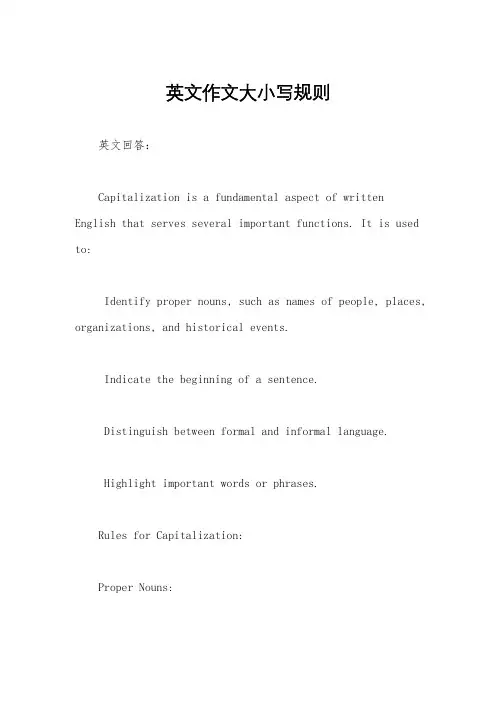
英文作文大小写规则英文回答:Capitalization is a fundamental aspect of written English that serves several important functions. It is used to:Identify proper nouns, such as names of people, places, organizations, and historical events.Indicate the beginning of a sentence.Distinguish between formal and informal language.Highlight important words or phrases.Rules for Capitalization:Proper Nouns:Capitalize the first letter of all proper nouns, including:Names of people and animals。
Names of places (cities, countries, states, mountains, rivers, etc.)。
Names of organizations (companies, political parties, clubs, etc.)。
Names of historical events and periods。
Names of specific monuments, buildings, or works of art。
Sentences:Capitalize the first letter of the first word of every sentence.Formal Language:In formal writing, nouns and adjectives that refer to important concepts or institutions are often capitalized.For example: "the Constitution," "the Government," "the Supreme Court"Emphasis:Capitalizing a word or phrase can emphasize its importance or significance.For example: "This is a matter of great Importance."Additional Rules:Do not capitalize common nouns or adjectives.Do not capitalize days of the week or months of the year unless they are part of a proper noun.Capitalize titles before a person's name, but notafter their name.Capitalize the first letter of direct quotations.Common Errors:Forgetting to capitalize proper nouns。
英文大小写公式
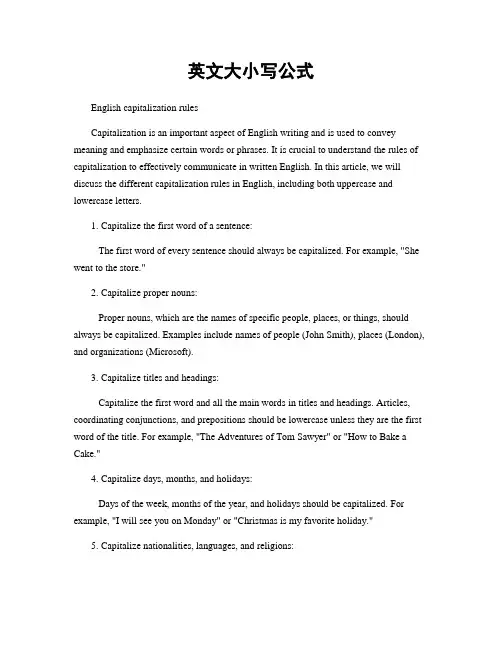
英文大小写公式English capitalization rulesCapitalization is an important aspect of English writing and is used to convey meaning and emphasize certain words or phrases. It is crucial to understand the rules of capitalization to effectively communicate in written English. In this article, we will discuss the different capitalization rules in English, including both uppercase and lowercase letters.1. Capitalize the first word of a sentence:The first word of every sentence should always be capitalized. For example, "She went to the store."2. Capitalize proper nouns:Proper nouns, which are the names of specific people, places, or things, should always be capitalized. Examples include names of people (John Smith), places (London), and organizations (Microsoft).3. Capitalize titles and headings:Capitalize the first word and all the main words in titles and headings. Articles, coordinating conjunctions, and prepositions should be lowercase unless they are the first word of the title. For example, "The Adventures of Tom Sawyer" or "How to Bake a Cake."4. Capitalize days, months, and holidays:Days of the week, months of the year, and holidays should be capitalized. For example, "I will see you on Monday" or "Christmas is my favorite holiday."5. Capitalize nationalities, languages, and religions:Nationalities, languages, and religions should be capitalized. For example, "He is French" or "She speaks Spanish."6. Capitalize the first word of a quote:When using a quotation, the first word of the quote should be capitalized. For example, "He said, 'I will be there.'"7. Capitalize proper adjectives:Proper adjectives, which are derived from proper nouns, should be capitalized. For example, "He enjoys Italian cuisine" or "She studied Greek mythology."8. Capitalize acronyms and initialisms:Acronyms, which are abbreviations formed from the initial letters of a group of words, and initialisms, which are abbreviations formed from the initial letters of each word in a phrase, should be capitalized. For example, "NASA" or "UNESCO."9. Capitalize important words in titles of books, movies, and songs:Important words in titles of books, movies, and songs should be capitalized. Articles, coordinating conjunctions, and prepositions should be lowercase unless they are the first or last word of the title. For example, "To Kill a Mockingbird" or "Gone with the Wind."10. Do not capitalize common nouns:Common nouns, which are general names for people, places, things, or ideas, should not be capitalized unless they are at the beginning of a sentence or part of a title. For example, "I have a dog" or "The city of Paris."11. Do not capitalize seasons, unless they are part of a title:Seasons, such as spring, summer, fall, and winter, should not be capitalized unless they are part of a title or a specific event. For example, "I love the colors of autumn" or "Winter Wonderland."12. Do not capitalize articles, coordinating conjunctions, and prepositions, unless they are the first or last word of a title:Articles (a, an, the), coordinating conjunctions (and, but, or, nor, for, yet, so), and prepositions (in, on, at, for, to, from, with, etc.) should be lowercase unless they are the first or last word of a title. For example, "The Fault in Our Stars" or "From Here to Eternity."It is important to note that these are general rules, and there may be exceptions or variations in specific cases. However, understanding and following these capitalization rules will greatly improve your written English communication skills. Practice and consistency are key to mastering the art of capitalization.。
EndNote Output Style修改─Citations、Bibliography、Footnotes的Author Name与Editor Name
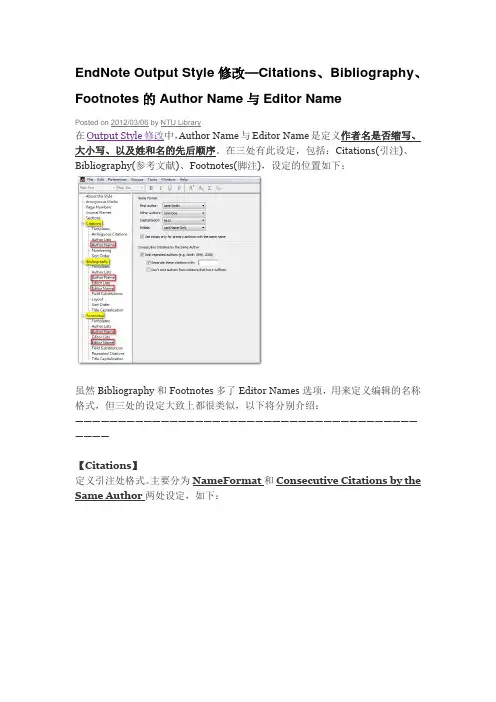
EndNote Output Style修改─Citations、Bibliography、在Output Style修改中,Author Name与Editor Name是定义作者名是否缩写、大小写、以及姓和名的先后顺序。
在三处有此设定,包括:Citations(引注)、Bibliography(参考文献)、Footnotes(脚注),设定的位置如下:虽然Bibliography和Footnotes多了Editor Names选项,用来定义编辑的名称格式,但三处的设定大致上都很类似,以下将分别介绍:————————————————————————————————————————————【Citations】定义引注处格式。
主要分为NameFormat和Consecutive Citations by the Same Author两处设定,如下:NameFormat:▪First author:第一作者的First Name(名)与Last Name(姓)顺序呈现。
▪Jane Smith:First Name(名)在前、Last Name(姓)在后。
▪Smith, Jane:Last Name(姓)在前、First Name(名)在后,中间以逗号区隔。
▪Smith Jane:Last Name(姓)在前、First Name(名)在后,中间不加逗号。
▪Other author:其余作者的First Name(名)与Last Name(姓)顺序呈现。
与前述First author设定法相同。
▪Capitalization:作者名的大小写。
▪As Is:按原Library中该笔书目的作者输入方式呈现,输入大写就呈现大写,输入小写就呈现小写。
▪Normal:每个字的第一个字母大写,其余小写。
▪All Uppercase:全部大写。
▪Small Caps:全部大写,但每个字的第一个字母为正常大小,其余字母缩小。
英文作文题目大小写规则
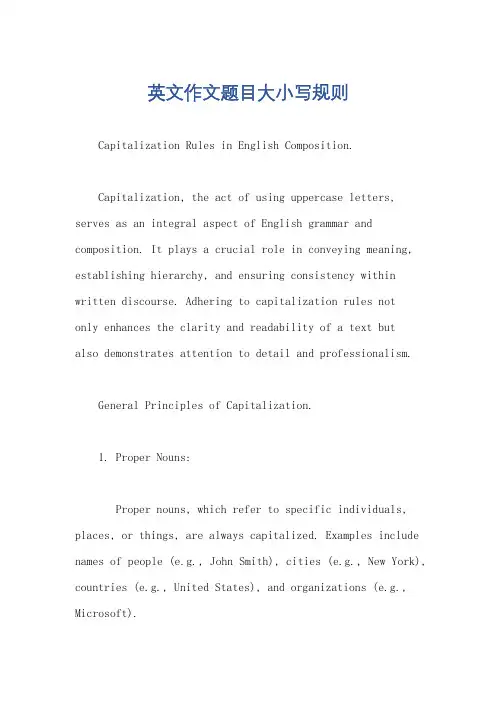
英文作文题目大小写规则Capitalization Rules in English Composition.Capitalization, the act of using uppercase letters, serves as an integral aspect of English grammar and composition. It plays a crucial role in conveying meaning, establishing hierarchy, and ensuring consistency within written discourse. Adhering to capitalization rules notonly enhances the clarity and readability of a text butalso demonstrates attention to detail and professionalism.General Principles of Capitalization.1. Proper Nouns:Proper nouns, which refer to specific individuals, places, or things, are always capitalized. Examples include names of people (e.g., John Smith), cities (e.g., New York), countries (e.g., United States), and organizations (e.g., Microsoft).2. First Word of a Sentence:The first word of every sentence, regardless of its length or purpose, is capitalized. This rule applies to both independent and dependent clauses.3. Titles and Positions:Titles of people, such as President, CEO, or Professor, are capitalized when used before or after their name. Additionally, job titles and positions within organizations should be capitalized.4. Days, Months, and Holidays:The names of days of the week, months of the year, and specific holidays are capitalized. Examples include Monday, February, and Thanksgiving.5. Historical Events and Periods:The names of historical events, periods, and movements are capitalized. Examples include the Renaissance, World War II, and the Civil Rights Movement.6. Religious Terms:References to religious figures, deities, and holy books are capitalized. Examples include God, Jesus Christ, and the Bible.Additional Capitalization Guidelines.1. Acronyms and Initialisms:Acronyms and initialisms of words or organizations are typically capitalized. Examples include NATO, FBI, and CNN.2. Direction and Place Names:Points of the compass (e.g., North, East) are capitalized when used as part of a place name. Additionally,regions and geographic features are capitalized. Examples include the Middle East, the Great Lakes, and Mount Everest.3. Titles of Works:Titles of books, articles, poems, plays, and other works of literature are capitalized in headline style. This means only the first word of the title, proper nouns, andthe last word of the title are capitalized.4. Superscripts and Subscripts:Superscripts and subscripts, which are numbers or symbols placed above or below a line of text, are typically not capitalized unless they represent a proper noun, suchas a Roman numeral.5. Quotations:The first word of a quoted sentence is capitalized, even if the quoted material is not a complete sentence.Exceptions to Capitalization Rules.1. Common Nouns After Prepositions:Common nouns, which refer to general things or concepts, are not capitalized when they come after prepositions. Examples include "of the house" and "in the garden."2. Titles and Positions When Not Used as Names:Titles and positions are not capitalized when they are used in a general or descriptive sense, rather than as a specific reference to an individual. Examples include "the president of the company" and "the professor of physics."3. Articles, Prepositions, and Conjunctions:Articles (a, an, the), prepositions (of, in, on), and conjunctions (and, but, or) are not capitalized unless they are the first word of a sentence or part of a propernoun.Conclusion.Capitalization plays a vital role in ensuring the clarity, consistency, and professionalism of written English. By adhering to the capitalization rules outlined above, writers can effectively convey meaning, establish hierarchy, and enhance the readability of their texts. Attention to capitalization demonstrates precision, attention to detail, and respect for the written word.。
英语大小写单词练习
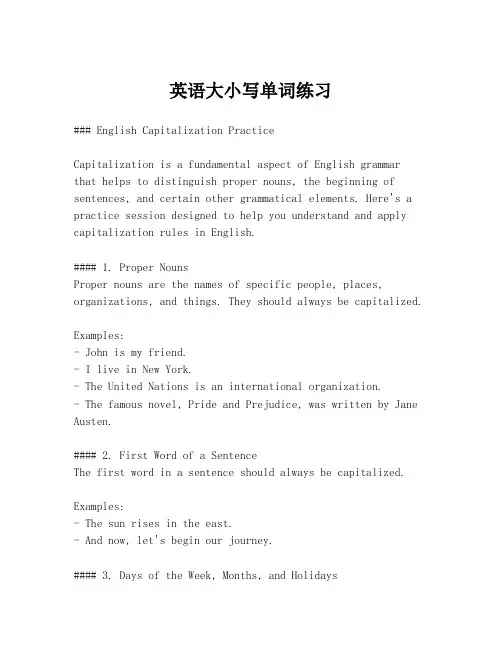
英语大小写单词练习### English Capitalization PracticeCapitalization is a fundamental aspect of English grammarthat helps to distinguish proper nouns, the beginning of sentences, and certain other grammatical elements. Here's a practice session designed to help you understand and apply capitalization rules in English.#### 1. Proper NounsProper nouns are the names of specific people, places, organizations, and things. They should always be capitalized.Examples:- John is my friend.- I live in New York.- The United Nations is an international organization.- The famous novel, Pride and Prejudice, was written by Jane Austen.#### 2. First Word of a SentenceThe first word in a sentence should always be capitalized.Examples:- The sun rises in the east.- And now, let's begin our journey.#### 3. Days of the Week, Months, and HolidaysThe names of days, months, and holidays are also capitalized.Examples:- We have a meeting on Monday.- My birthday is in December.- I love celebrating Christmas with my family.#### 4. Titles and HonorificsTitles and honorifics preceding a name are capitalized.Examples:- Dr. Smith will be giving a lecture.- I met the President of the company.#### 5. Acronyms and InitialismsLetters that stand for a name or phrase are capitalized.Examples:- NASA is short for National Aeronautics and Space Administration.- We use GPS for Global Positioning System.#### 6. Geographical FeaturesNames of continents, countries, cities, and geographical features are capitalized.Examples:- I visited the Eiffel Tower in Paris, France.- The Amazon River is the second longest river in the world. #### 7. Directions as NamesWhen directions are used as part of a place name, they are capitalized.Examples:- I am moving to North Carolina.- The South Pole is the southernmost point on Earth.#### 8. Newspaper, Magazine, and Organization NamesThe names of newspapers, magazines, and organizations are capitalized.Examples:- I read an article in The New York Times.- She subscribes to National Geographic.#### 9. Adjectives Derived from Proper NounsWhen an adjective is derived from a proper noun, it is capitalized.Examples:- The Siberian tiger is known for its size.- She has a French accent.#### Practice ExerciseHere are some sentences for you to practice capitalization. Correct the capitalization where necessary.1. i am going to the library on tuesday.2. the himalayas are the highest mountain range in the world.3. we read an article in the wall street journal about elvis presley.4. my favorite holiday is thanksgiving.5. the amazon rainforest is a biodiversity hotspot.Corrected Sentences:1. I am going to the library on Tuesday.2. The Himalayas are the highest mountain range in the world.3. We read an article in The Wall Street Journal about Elvis Presley.4. My favorite holiday is Thanksgiving.5. The Amazon rainforest is a biodiversity hotspot.Capitalization is not just about following rules; it's about making your writing clear and respectful. By practicing these rules, you'll enhance your writing and make it more professional.。
英语作文的大小写问题
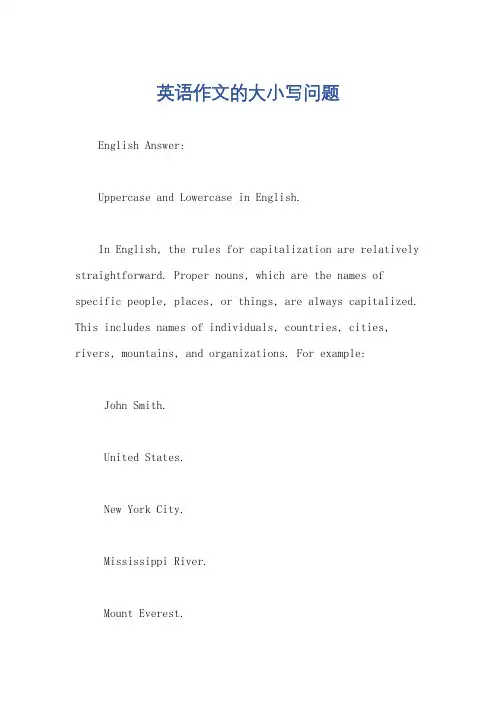
英语作文的大小写问题English Answer:Uppercase and Lowercase in English.In English, the rules for capitalization are relatively straightforward. Proper nouns, which are the names of specific people, places, or things, are always capitalized. This includes names of individuals, countries, cities, rivers, mountains, and organizations. For example:John Smith.United States.New York City.Mississippi River.Mount Everest.United Nations.Other words that are capitalized include the first word of a sentence, the first word of a direct quotation, and the names of months and days of the week. For example:The sun is shining."I love to read," she said.We're going to the beach in August.I have an appointment on Tuesday.Exceptions to the Rule.There are a few exceptions to the rule of capitalizing proper nouns. For example, the names of common nouns that are used in a general sense are not capitalized. For example:I'm going to the store. (not "the Store")。
合同金额英文大小写的标准写法
合同金额英文大小写的标准写法Standard Format for Writing Contract Amounts in English.Purpose:To ensure clarity and consistency in the expression of contract amounts, it is essential to adhere to established standards for writing them in both numerical andalphabetical formats. This article provides a comprehensive guide to the proper writing of contract amounts in English, covering both uppercase and lowercase conventions.Numerical Format:1. Numerals Only:In general, it is preferred to express contract amounts using numerals only, without the use of currency symbols or punctuation. For example:Incorrect: The contract amount is $1,000,000.2. Decimal Notation:When expressing amounts less than one dollar or pound, decimal notation should be used. The decimal point should be placed after the last whole number, and zeros should be added as placeholders if necessary. For example:Correct: The contract amount is 0.50.Incorrect: The contract amount is .50.3. Commas as Thousands Separators:For large numbers, commas should be used as thousands separators to improve readability. The comma should be placed every three digits, starting from the right. For example:Incorrect: The contract amount is 1000000.Alphabetical Format:In addition to the numerical format, it is also customary to write contract amounts in alphabetical form, which involves spelling out the amount in words. This is particularly useful when writing legal documents or contracts, as it helps to prevent any ambiguity or alteration.1. Capitalization:When writing contract amounts in alphabetical form, all words except conjunctions and prepositions should be capitalized. For example:Correct: The contract amount is One Million Dollars.Incorrect: The contract amount is one million dollars.2. Use of Hyphens:Hyphens should be used to connect compound words in alphabetical amounts. For example:Correct: The contract amount is Two Hundred Thousand Dollars.Incorrect: The contract amount is Two Hundred ThousandDollars.3. Use of the Word "Only":The word "only" should be inserted after the amount in alphabetical form to indicate that there are no other components or fractions. For example:Correct: The contract amount is One Hundred Dollars Only.Incorrect: The contract amount is One Hundred Dollars.Exceptions:In certain cases, it may be necessary to deviate from the standard format for writing contract amounts. For instance:Contracts Involving Multiple Currencies: When a contract involves multiple currencies, each amount should be clearly labeled with its respective currency symbol.Contracts with Variable Amounts: If the contract amount is subject to change or adjustment, it may be necessary to use language that reflects this uncertainty.Legal Considerations: In certain legal contexts, specific rules or regulations may govern the formatting of contract amounts.Conclusion:Adhering to standardized conventions for writingcontract amounts in both numerical and alphabetical formats is crucial for clarity, accuracy, and legal validity. By following the guidelines outlined in this article, parties involved in contracts can ensure that the financial obligations are clearly and accurately communicated.。
英文标题单词首字母大小写Capitalization in Titles
英文标题单词首字母大小写如何确定●一般实词(名词、动词、代词、形容词、副词等)首字母大写,虚词(介词、冠词、连词、感叹词)首字母小写。
比如:Spring Festival of My H..●标题第一个单词、最后一个单词无论词性首字母应该大写。
●超过5个字母的虚词,如between、without、alongside、underneath等应该大写。
●如果是重要提示性标题,或者是专有名称标题,可以全部字母都用大写,但这种用法应慎重。
附:(英文标题大小写规则)CapitalizationRule 1.Capitalize the first word of a quoted sentence.Examples:He said, "Treat her as you would your own daughter.""Look out!" she screamed. "You almost ran into my child."Rule 2. Capitalize a proper noun.Example:Golden Gate BridgeRule 3.Capitalize a person's title when it precedes the name. Do not capitalize when the title is acting as a description following the name.Examples:Chairperson PetrovMs. Petrov, the chairperson of the company, will address us atnoon.Rule 4.Capitalize the person's title when it follows the name on the address or signature line.Example:Sincerely,Ms. Haines, ChairpersonRule 5.Capitalize the titles of high-ranking government officials when used with or before their names. Do not capitalize the civil title if it is used instead of the name.Examples:The president will address Congress.All senators are expected to attend.The governors, lieutenant governors, and attorneys generalcalled for a special task force.Governor Fortinbrass, Lieutenant Governor Poppins, AttorneyGeneral Dalloway, and Senators James and Twain will attend.Rule 6.Capitalize any title when used as a direct address.Example:Will you take my temperature, Doctor?Rule7.Capitalize points of the compass only when they refer to specific regions.Examples:We have had three relatives visit from the South.Go south three blocks and then turn left.We live in the southeast section of town.Southeast is just an adjective here describing section, so itshould not be capitalized.Rule 8.Always capitalize the first and last words of titles of publications regardless of their parts of speech. Capitalize other words within titles, including the short verb forms Is, Are, and Be.Exception:Do not capitalize little words within titles such as a, an, the, but, as, if, and, or, nor, or prepositions, regardless of their length.Examples:The Day of the JackalWhat Color Is Your Parachute?A Tale of Two CitiesRule Capitalize federal or state when used as part of an official agency name or inernment documents where these terms represent an official name. If theyare being used as general terms, you may use lowercase letters.Examples:The state has evidence to the contrary.That is a federal offense.The State Board of Equalization collects sales taxes.We will visit three states during our summer vacation.The Federal Bureau of Investigation has been subject to muchscrutiny and criticism lately.Her business must comply with all county, state, and federallaws.Rule 10.You may capitalize words such as department, bureau, and office if you have prepared your text in the following way:Example:The Bureau of Land Management (Bureau) has some jurisdiction over Indian lands. The Bureau is finding its administrative role tobe challenging.Rule11.Do not capitalize names of seasons.Example:I love autumn colors and spring flowers.Rule 12.Capitalize the first word of a salutation and the first word of a complimentary close.Examples:Dear Ms. Mohamed:My dear Mr. Sanchez:Very truly yours,Rule13.Capitalize words derived from proper nouns.Example:I must take English and math.English is capitalized because it comes from the proper nounEngland, but math does not come from Mathland.Rule14.Capitalize the names of specific course titles.Example:I must take history and Algebra 2.Rule 15.After a sentence ending with a colon, do not capitalize the first word if it begins a list.Example:These are my favorite foods: chocolate cake, spaghetti, and artichokes.Rule 16.Do not capitalize when only one sentence follows a sentence ending with a colon.Example:I love Jane Smiley's writing: her book, A Thousand Acres, was beautiful.Rule17.Capitalize when two or more sentences follow a sentence ending with a colon.Example:I love Jane Smiley's writing: Her book, A Thousand Acres, wasbeautiful. Also,Moo was clever.The Rules of Word Capitalization In Headlines(英文标题大小写规则)Whether it’s an article, a sales letter, an magazine ad or just the subject heading in an email, the objective of the headline is to get the reader to read more than just the headline.So what makes this headline an attention grabber?Let’s look at 4 points within this headline that makes it“grab” the readers’ attention.1. Ask a QuestionIf you ask a question in your headline then the reader is inclined to want to answer the question themselves. The reader is intrigued. This prompts the reader to read on. Asking a question is one of the best ways to ‘grab’ the attention.2. Use Inverted CommasUse inverted commas around a single word as I have done, or around a group of words or the whole headline. The inverted commas themselves actually highlight something that the reader can latch on to. If you had 10 headlines and 1 had inverted commas around it, then it’s more likely it would be the most read hea dline.There is another benefit to using inverted commas around the whole heading. It often means that in an alphabetical list of headlines you will be near the top. This is because inverted commas come before the letter “A”.3. Capitalize the First Letter of Each Major Word in the HeadlineCapitalizing each ‘major’ word in the headline grabs the readers attention. However do not capitalize every word. Do not capitalize words such as ‘a’, ‘the’, ‘of’, ‘to’, ‘on’, ‘in’ and ‘an’ unless they are the first word of the headline. It’s just not necessary.Take a look at the ‘headline’ above for point 3. The words’ the’, ‘of’ and ‘in’ are not capitalized. Let’s see what this headline would look like if they were:Capitalize The First Letter Of Each Major Word In The HeadlineIt just does not impress as much. There is no distinction between the words. The‘major’ words do not stand out as much.However, in the headline under point 3 the following groups of words stand out more because they are separated by the not so important words:CapitalizeFirst LetterEach Major WordHeadline4. Use powerful words“Grab” is a powerful word. So is “Free”. Even “Powerful” is a powerful word for that matter. Try and have at least 1 andmaybe 2 powerful words in your headline. These powerful words will draw in the readers attention and prompt them to keep reading.Use these 4 techniques to help you write better headlines. Get the headline wrong and there is no use writing the article, the magazine ad or the sales letter.Get the headline right and you are half way to making the sale or obtaining a new magazine subscriber.Writing TipsCapitalization in TitlesNIVA follows the general rules for capitalizing words in document titles set out in The Chicago Manual of Style (with one minor exception—see the note in rule 3):1.Always capitalize the first and the last word.2.Capitalize all nouns, pronouns, adjectives, verbs, adverbs,and subordinate conjunctions ("as", "because","although").3.Lowercase all articles, coordinate conjunctions ("and","or", "nor"), and prepositions regardless of length, whenthey are other than the first or last word. (Note: NIVAprefers to capitalize prepositions of five characters or more ("after", "among", "between").)4.Lowercase the "to" in an infinitive.Most writers are familiar with these general rules. But some have difficulty identifying the various parts of speech, while others have internalized incorrect "rules" taught in elementary school. These individuals are therefore prone to making mistakes when capitalizing or lowercasing words in titles. The most common mistakes are presented below.Two-Letter WordsSome writers lowercase all two-letter words, probably by extrapolation from the short prepositions "of", "to", "up", and so on, and the word "to" in infinitives. But if a two-letter word is acting as a noun, pronoun, adjective, or adverb, it must be capitalized. For example:Go Tell it on the Mountain(wrong; "it" is a pronoun and should be capitalized)When is a Spade a Spade?(wrong; "is" is a verb and should be capitalized) Multipurpose WordsSome writers lowercase words that can function as prepositions when those words are currently functioning in other capacities. For example:The Man in the Moon Owns a Yellow Balloon(correct; "in" is functioning as a preposition and should be lowercased)Bringing in the Sheaves(wrong; "in" is functioning as an adverb and should becapitalized)Phrasal VerbsSome writers find it hard to decide how to capitalize a title containing a phrasal verb. Phrasal verbs are verbs whose meaning is completed by a word called a particle. For example, the verb "to give" has a different meaning than the phrasal verb "to give up".Like other multipurpose words, words functioning as particles must be distinguished from the same words functioning as prepositions. Particles are always capitalized because they form part of the verb. For example:My Travels up Nova Scotia's South Shore(correct; "up" is functioning as a preposition and should be lowercased)Setting up Your Computer(wrong; "up" is functioning as a particle and should becapitalized)Mistaken NotionsGrammar just doesn't sink naturally into everyone's head. To some writers, the fact that one word resembles another is enough reason to treat those words equally when it comes to capitalization in a title. For example:The Time of their Lives(wrong; "their" is an adjective and should be capitalized—the writer probably extrapolated from "the")。
英语作文题目的大小写问题
英语作文题目的大小写问题English Answer:In general, the title of an essay in English should follow the following capitalization rules:Major words are capitalized: This includes nouns, verbs, adjectives, and adverbs that are considered important or essential to the meaning of the title.Minor words are lowercase: This includes articles (a, an, the), prepositions (of, to, in), and conjunctions (and, but, or).Exceptions: Certain words are always capitalized, regardless of their grammatical function. These include proper nouns (names of people, places, and organizations) and titles (Mr., Mrs., Dr.).For example, the title "The Impact of Climate Change onCoastal Communities" follows the above rules correctly. All major words are capitalized, while minor words are lowercase.In some cases, you may encounter titles that deviate from these rules. This is often done for stylistic or creative purposes. However, it is generally advisable to adhere to the standard capitalization conventions to ensure clarity and consistency.Additional Considerations:Titles in quotations: If the title is a quote or a borrowed phrase, it should retain its original capitalization.Titles in all caps: Titles that are written entirely in capital letters are typically used for emphasis or stylistic purposes. However, it is not the standard convention for essay titles.Titles with hyphens or dashes: Capitalization rulesapply to each word individually, even if they are connected by a hyphen or dash.Chinese Answer:英语论文标题的大小写规则总体上遵循以下原则:重要的单词大写,包括名词、动词、形容词和副词,这些单词对标题的含义至关重要。
EndNote-Output-Style修改─Citations、Bibliography、Footnotes的Author-Name与Editor-Name教学内容
在Output Style修改中,Author Name与Editor Name是定义作者名是否缩写、大小写、以及姓和名的先后顺序。
在三处有此设定,包括:Citations(引注)、Bibliography(参考文献)、Footnotes(脚注),设定的位置如下:虽然Bibliography和Footnotes多了Editor Names选项,用来定义编辑的名称格式,但三处的设定大致上都很类似,以下将分别介绍:————————————————————————————————————————————【Citations】定义引注处格式。
主要分为NameFormat和Consecutive Citations by the Same Author两处设定,如下:NameFormat:▪First author:第一作者的First Name(名)与Last Name(姓)顺序呈现。
▪Jane Smith:First Name(名)在前、Last Name(姓)在后。
▪Smith, Jane:Last Name(姓)在前、First Name(名)在后,中间以逗号区隔。
▪Smith Jane:Last Name(姓)在前、First Name(名)在后,中间不加逗号。
▪Other author:其余作者的First Name(名)与Last Name(姓)顺序呈现。
与前述First author设定法相同。
▪Capitalization:作者名的大小写。
▪As Is:按原Library中该笔书目的作者输入方式呈现,输入大写就呈现大写,输入小写就呈现小写。
▪Normal:每个字的第一个字母大写,其余小写。
▪All Uppercase:全部大写。
▪Small Caps:全部大写,但每个字的第一个字母为正常大小,其余字母缩小。
▪Initials:呈现缩写或全称,以及定义缩写的格式。
▪Full Name:作者名以全称呈现。
- 1、下载文档前请自行甄别文档内容的完整性,平台不提供额外的编辑、内容补充、找答案等附加服务。
- 2、"仅部分预览"的文档,不可在线预览部分如存在完整性等问题,可反馈申请退款(可完整预览的文档不适用该条件!)。
- 3、如文档侵犯您的权益,请联系客服反馈,我们会尽快为您处理(人工客服工作时间:9:00-18:30)。
The first words of sentences
Not only a complete sentence, but a sentence fragment treated as a sentence, should begin with a capital letter. The first word of quoted speech is capitalized. If a quoted sentence is broken into two parts and put in two pairs of quotation marks, the second part does not begin with a capital letter unless the first word is a proper noun or an adjective derived from a proper noun.
4. No period is used at the end of a title 5. Use a question mark if the title is a direct question 6. Use quotation marks with quotes or titles of articles 7. Underline or italicize names of books.
key words in titles
How to capitalize titles? 1. the first words and the last words; 2. other words in the title, including words following hyphens in compound words;
e.g. 1. He said, “My trip to Mount Tai was interesting but tiring.” 2. “My trip to Mount Tai,” he said, “was interesting but tiring.” 3. She answered, “At weekends.”
Special Program 2
Capitalization
Contents
Capitals are used mainly at three places: 1. the first words of sentences; 2. key words in titles; 3. proper names
3. Do not capitalize 3.1 articles (a, an, the) 3.2 coordinating conjunctions (and, or, but, nor, for), 3.3 short prepositions; 3.4 the to in infinitives;
Words derived from proper names are usually capitalized: Marxist Darwinism Hegelian Confucian Latinize Vietnamize
Proper names and their derivatives may become common nouns, verbs or adjectives. anglicize (英国化),
Fra biblioteke.g. My First Visit to the Palace Museum What Can the Artist Do in the World of Today? The English-Speaking People in Quebec The Myth if a “Negro Literature” The People Without a Country Dickens and David Copperfield
proper names
Proper names are capitalized. e.g. Mike, Jack, Mary Hangzhou, London; California; Britain English, Greek
Common nouns that are parts of proper names are capitalized: e.g. a street Xueyuan Street lake the West Lake middle, age the Middle Age People, republic the People’s Republic of China university China Jiliang University
